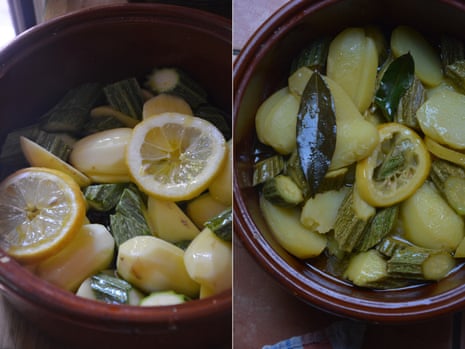In chapter nine of her magnificent book Vegetable Literacy, Deborah Madison describes how, in Arizona, an elderly cowboy named Ernie cooked her a steak with a mess of zucchini stewed in margarine for half an hour; a film treatment in a sentence. She goes on to describe her scepticism, and how it dissolved because these turned out to be the best zucchini she had ever eaten. And not because of the margarine or zucchini, but because Ernie had cooked them long enough for the defiant and definite squash flavour to emerge.
I think Ernie the cowboy would get on with my friend Ezio the civil engineer, who showed me how to cook zucchini long enough that they stop keeping up appearances and collapse into a sauce for pasta. And I think both Ernie and Ezio would get on with the Roman cook, gardener and teacher Carla Tomasi, who taught me that, most of the time, vegetable goodness lies at one of two poles: raw or well-cooked, rarely in the middle. This seems particularly true with zucchini, which, of course, are courgettes, or baby marrows to others. However, as I am writing about Ernie and Madison in Rome, zucchini seems the right name this week.
Ernie may be memorable, but he is also just a fraction of chapter nine, which is all about the Cucurbitaceae – that is, the visually compelling cucurbit family, native to the Andes and Mesoamerica, which includes buffalo gourds, chayotes, cucumbers, gourds, melons, pumpkins, winter and summer squashes. Zucchini are a variety of small, thin-skinned summer squash developed in Milan in the early 19th century, and while they never really went away, I am so glad they are back; that pale green and ribbed romanesci are on the front row once more, each one sporting an eager, flaming flower. Also dark green varieties, striped and speckled ones, zucchini balls and their extremely long and cheeky cousins.
All varieties are suitable for this week’s dish, which is part Madison’s recipe from Ernie, part mine, and part recipe from the Greek cook Rena Salaman, who believes that if a vegetable dish includes olive oil, the amount should be considerable (a quarter of a pint – pint being one of the most beautiful words in the English language – or 120ml). She notes that if dishes that include oil lack oil, they are dismissed as νεροβραστο (nerovrasto), which means “water boiled” or “insipid” – the ultimate degradation for any vegetable to undergo. Now is also probably a good moment to remember that olive oil is not just a cooking fat, it is a principal ingredient with a deep flavour, like liquid herbs.
I always think of this way of cooking vegetables (in plenty of extra-virgin olive oil with just a bit of water and covered) as a steamy braise. Also, a cooking circle: the water from the vegetables is released and provides a cooking liquid that is then partly absorbed back as cooking progresses. Even more so if you let the dish sit and eat it warm. Serve Ernie-style with a steak, Rena-style with a spoonful of egg and lemon soup (avgolemono), Deborah-style with crisp breadcrumbs or hard-boiled eggs, Carla-style with white beans or twice-cooked greens, or Rachel-style with bread and too much wine.
Zucchini, potato, lemon and olive oil
Prep 10 min
Cook 45 min
Serves 4
800g new potatoes
800g zucchini/courgettes
120ml olive oil
1 fat garlic clove, peeled and cut in two
2 thick lemon slices
2 bay leaves
Salt
80ml water
Scrub or peel the potatoes, then cut in half (or quarters, if they are bigger than an egg). Trim the zucchini and cut on a bias into similar-sized chunks.
Put a large, heavy-based casserole for which you have a lid on a medium-low heat, add the oil and warm it a little before adding the potatoes, courgettes, garlic, lemon, bay leaves and a good pinch of salt. Stir so everything is well coated, then add the water and bring to a gentle simmer.
Cover and cook gently for 40 minutes, lifting the lid to stir from time to time, until the vegetables are soft and surrounded by oily juices.

Comments (…)
Sign in or create your Guardian account to join the discussion